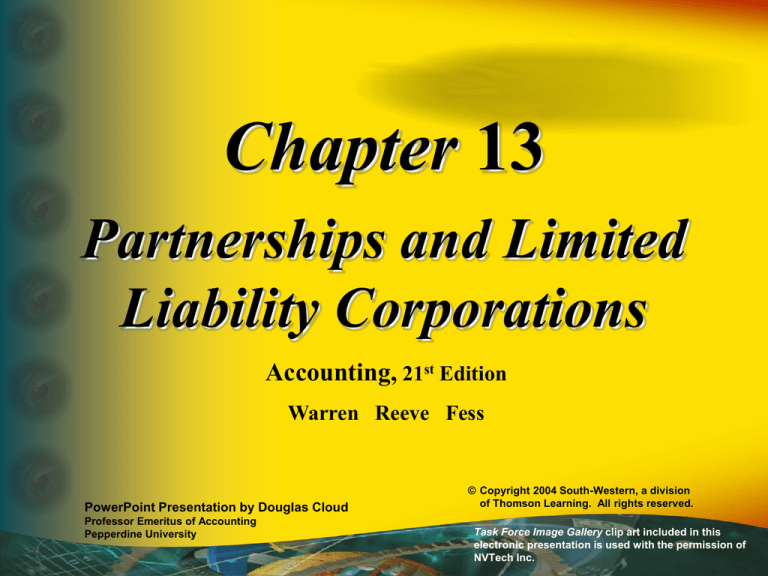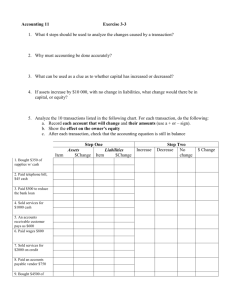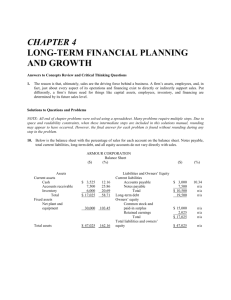
Chapter 13
Partnerships and Limited
Liability Corporations
Accounting, 21st Edition
Warren Reeve Fess
PowerPoint Presentation by Douglas Cloud
Professor Emeritus of Accounting
Pepperdine University
© Copyright 2004 South-Western, a division
of Thomson Learning. All rights reserved.
Task Force Image Gallery clip art included in this
electronic presentation is used with the permission of
NVTech Inc.
Some of the action has been automated,
so click the mouse when you see this
lightning bolt in the lower right-hand
corner of the screen. You can point and
click anywhere on the screen.
Objectives
1. Describe the basic characteristics of
After studying
this
proprietorships,
corporations,
chapter,
should
partnerships,
and you
limited
liability
corporation. be able to:
2. Describe and illustrate the equity
reporting for proprietorships, corporations,
partnerships, and limited liability
corporations.
3. Describe and illustrate the accounting for
forming a partnership.
Objectives
4. Describe and illustrate the accounting
for dividing the net income and net loss
of a partnership.
5. Describe and illustrate the accounting
for the dissolution of a partnership.
6. Describe and illustrate the accounting
for liquidation of a partnership.
7. Describe the lifecycle of a business,
including the role of venture capitalists,
initial public offerings, and
underwriters.
Alternative Forms of Business Entities
Advantages
A proprietorship is
owned by one
individual.
Joe’s
Review of Chapter 1
• Ease in organizing
• Low cost of
organizing
Disadvantages
• Difficulty in raising
large amounts of
capital
• Unlimited liability
Alternative Forms of Business Entities
A corporation is
organized under
state or federal
statutes as a separate
legal entity.
J & M, Inc.
Advantages
• The ability to obtain large
amounts of resources by
issuing stocks
• Limited liability for the
owners
Disadvantages
• Double taxation
• More complexity
and regulations
Alternative Forms of Business Entities
J & M, Inc.
A business may organize
as an S Corporation. The
IRS allows income to pass
through the S Corporation
to the individual
stockholder without the
corporation having to pay
tax on the income.
Alternative Forms of Business Entities
A partnership is an
association of two
or more individuals.
Joe and Marty’s
Advantages
• More financial
resources than a
proprietorship
• Additional
management skills
Alternative Forms of Business Entities
A partnership is an
association of two
or more individuals.
Joe and Marty’s
•
•
•
•
Disadvantages
Limited life
Unlimited liability
Co-ownership of
partnership property
Mutual agency
Alternative Forms of Business Entities
An important right of
partners is to participate in
the income of the
partnership.
Alternative Forms of Business Entities
Each partner must
report their share of
partnership income
on their personal
tax returns.
Alternative Forms of Business Entities
A partnership is created
by a contract, known as
the partnership
agreement or articles of
partnership.
Alternative Forms of Business Entities
A variant of the
regular partnership
is a limitedThis form of partnership
partnership.allows partners that are
not involved in the
operations of the
partnership to retain
limited liability.
Limited Liability Corporations
Combines the advantages of the corporate and
partnership forms.
Owners are termed “members” rather than
“partners.”
Members must create an operating agreement.
LLC may elect to be treated as a partnership for
tax purposes.
Continued
Limited Liability Corporations
Unless specified in the operating agreement,
LLCs have a limited life.
Members may elect operating the LLC as a
“member managed” entity.
LLC provides limited liability for the members.
LLCs must file “articles of organization” with
state governmental authorities.
Comparison of Alternate
Entity Characteristics
Ease of Formation
Proprietorship
Corporation
Partnership
LLC
Simple
Complex
Simple
Moderate
Comparison of Alternate
Entity Characteristics
Legal Liability
Proprietorship
Corporation
Partnership
LLC
No limitation
Limited liability
No limitation
Limited liability
Comparison of Alternate
Entity Characteristics
Taxation
Proprietorship
Corporation
Partnership
LLC
Nontaxable entity
Taxable entity
Nontaxable entity
Nontaxable entity by election
Comparison of Alternate
Entity Characteristics
Limitation on Life of Entity
Proprietorship
Corporation
Partnership
LLC
Yes
No
Yes
Yes
Comparison of Alternate
Entity Characteristics
Ease of Raising Capital
Proprietorship
Corporation
Partnership
LLC
Difficult
Easier
Moderate
Moderate
Equity Reporting for
Alternative Entity Forms
Proprietorships
Proprietorships use a capital account to
record investments by the owner of the
business.
Withdrawals by the owner are recorded
in the owner’s drawing account.
Equity Reporting for
Alternative Entity Forms
Proprietorships
Greene Landscapes
Statement of Owner’s Equity
For the year ended December 31, 2006
Duncan Greene, capital, Dec. 31, 2005
$345,000
Net income
$79,000
Less withdrawals
35,000
Increase in owner’s equity
44,000
Duncan Greene, capital, Dec. 31, 2006
$389,000
Equity Reporting for
Alternative Entity Forms
Corporations
Investments by stockholders in the
business use capital stock accounts,
such as Common Stock and Preferred
Stock.
Dividends to owners (stockholders) are
recorded by a debit to Retained
Earnings.
Equity Reporting for
Alternative Entity Forms
Corporations
Equity Reporting for
Alternative Entity Forms
Partnerships and Limited Liability Corporations
Investments and withdrawals for
partnerships is similar to proprietorships,
except there is a capital and drawing
account for each partner.
Limited liability corporations are similar
to a partnership except that each owner is
referred to as “member.”
Equity Reporting for Alternative
Entity Forms
Partnerships
Forming a Partnership
Joseph Stevens and Earl Foster agree to combine
their hardware businesses in a partnership. They
agree that the partnership is to assume the
liabilities of the separate businesses.
Stevens’ Transfer of Assets, Liability, and Equity
Apr. 1 Cash
Accounts Receivable
Merchandise Inventory
Store Equipment
Office Equipment
Allowance for Doubtful Accounts
Accounts Payable
Joseph Stevens, Capital
7 200
16 300
28 700
5 400
1 500
00
00
00
00
00
1 500 00
2 600 00
55 000 00
Forming a Partnership
A similar entry would be made
for the assets, liabilities, and
equity of Earl Foster.
Forming a Partnership
Assume that instead of forming a partnership, the
two men formed a limited liability corporation.
Stevens’ Transfer of Assets, Liability, and Equity
Apr. 1 Cash
Accounts Receivable
Merchandise Inventory
Store Equipment
Office Equipment
Allowance for Doubtful Accounts
Accounts Payable
Joseph Stevens, Member Equity
7 200
16 300
28 700
5 400
1 500
00
00
00
00
00
1 500 00
2 600 00
55 000 00
Dividing Income
Services of Partners
The partnership agreement of Jennifer Stone and
Crystal Mills provides for Stone to have an annual
salary allowance of $30,000 and Mills is to receive
$24,000. Any net income is to be divided equally.
The firm had a net income of $75,000.
Salary allowance
Remaining income
Division of net income
J. Stone
$30,000
10,500
$40,500
C. Mills Total
$24,000 $54,000
10,500 21,000
$34,500 $75,000
Dividing Income
Services of Partners
Dec. 31 Income Summary
75 000 00
Jennifer Stone, Capital
40 500 00
Crystal Mills, Capital
34 500 00
Dividing Income
LLC Alternative
Dec. 31 Income Summary
75 000 00
Jennifer Stone, Member Equity
40 500 00
Crystal Mills, Member Equity
34 500 00
Dividing Income
Services of Partners and Investments
The partnership agreement of Jennifer Stone and
Crystal Mills provides for Stone to have an
annual salary allowance of $30,000 and Mills is
to receive $24,000. Interest of 12% is provided
on each partner’s capital balance on January 1.
Any net income is to be divided equally. The
firm had a net income of $75,000.
Dividing Income
Services of Partners and Investments
Salary allowance
Interest allowance
Remaining income
Division of net income
J. Stone
$30,000
9,600
2,100
$41,700
$80,000 x
12%
C. Mills Total
$24,000 $54,000
7,200 16,800
2,100
4,200
$33,300 x $75,000
$60,000
12%
Dividing Income
Services of Partners
Dec. 31 Income Summary
75 000 00
Jennifer Stone, Capital
41 700 00
Crystal Mills, Capital
33 300 00
Dividing Income
LLC Alternative
Dec. 31 Income Summary
75 000 00
Jennifer Stone, Member Equity
41 700 00
Crystal Mills, Member Equity
33 300 00
Dividing Income
Allowances Exceed Net Income
Assume the same facts as before except that
the net income is only $50,000.
Salary allowance
Interest allowance
Total
Deduct excess equally
Division of net income
J. Stone
$30,000
9,600
$39,600
10,400
$29,200
C. Mills Total
$24,000 $54,000
7,200 16,800
$31,200 $70,800
10,400 20,800
$20,800 $50,000
Partnership Dissolution
Admitting a Partner
A person may be admitted to a partnership only
with the consent of all partners by:
1. Purchasing an interest from one or more of
the current partners.
2. Contributing assets to the partnership.
Partnership Dissolution
Purchasing an Interest in a Partnership
Partners Tom Andrews and Nathan Bell
have capital balances of $50,000 each. On
June 1, each sells one-fifth of his equity to
Joe Canter for $10,000 in cash.
Partnership Dissolution
Purchasing an Interest in a Partnership
June 1 Tom Andrews, Capital
Nathan Bell, Capital
Joe Canter, Capital
10 000 00
10 000 00
20 000 00
For a LLC, members’ equity accounts would
have been used rather than capital accounts.
Partnership Dissolution
Contributing Assets to a Partnership
Partners Donald Lewis and Gerald Morton
have capital balances of $35,000 and
$25,000, respectively. On June 1, Sharon
Nelson joins the partnership by permission
and makes an investment of $20,000 cash.
Partnership Dissolution
Contributing Assets to a Partnership
June 1 Cash
Sharon Nelson, Capital
20 000 00
20 000 00
For a LLC, Sharon Nelson, Member Equity
would have been credited.
Partnership Dissolution
Revaluation of Assets
Partners Donald Lewis and Gerald Morton
have capital balances of $35,000 and
$25,000, respectively. The balance in
Merchandise Inventory is $14,000 and
the current replacement value is $17,000.
The partners share net income equally.
Partnership Dissolution
Revaluation of Assets
June 1 Merchandise Inventory
3 000 00
Donald Lewis, Capital
1 500 00
Gerald Morton, Capital
1 500 00
Because the LLC alternative follows a pattern
of replacing “Capital” with “Member Equity,”
the LLC entry will not be shown again.
Partnership Dissolution
Partner Bonuses
On March 1, the partnership of Marsha
Jenkins and Helen Kramer admit Alex
Diaz as a new partner. The assets of the
old partnership are adjusted to a fair
market values and the resulting capital
balances for Jenkins and Kramer are
$30,000 and $24,000, respectively.
Partnership Dissolution
Partner Bonuses
Jenkins and Kramer agree to admit Diaz
as a partner for $31,000. In return, Diaz
will receive a one-third equity in the
partnership and will share income and
losses equally with Jenkins and Kramer.
Partnership Dissolution
Partner Bonuses from New Partner
Equity of Jenkins
Equity of Kramer
Diaz’s Contribution
Total equity after admitting Diaz
Diaz’s interest (1/3 x $75,000)
$20,000
24,000
31,000
$75,000
$25,000
Diaz’s contribution
Diaz’s equity after admission
Bonus paid to Jenkins and Kramer
$31,000
25,000
$ 6,000
Partnership Dissolution
Partner Bonuses
Mar. 1 Cash
Alex Diaz, Capital
31 000 00
25 000 00
Marsha Jenkins, Capital
3 000 00
Helen Kramer, Capital
3 000 00
$6000 ÷ 2
Partnership Dissolution
Partner Bonuses
After adjusting the market values, the
capital balance of Janice Cowen is
$580,000 and the capital balance of Steve
Dodd is $40,000. Ellen Chua receives a
one-fourth interest in the partnership for a
contribution of $30,000. Before admitting
Chua, Cowen and Dodd shared net income
using a 2 to 1 ratio.
Partnership Dissolution
Partner Bonuses to New Partner
Equity of Cowen
Equity of Dodd
Chua’s Contribution
Total equity after admitting Chua
Chua’s interest (1/4 x $150,000)
Chua’s contribution
Chua’s equity after admission
Bonus paid to Chua
$ 80,000
40,000
30,000
$150,000
$ 37,500
$30,000
37,500
$ 7,500
Partnership Dissolution
Partner Bonuses
Mar. 1 Cash
Janice Cowen, Capital
Steve Dodd, Capital
Ellen Chua, Capital
2/3 x
$7,50
1/3 x
0
$7,50
0
30 000 00
5 000 00
2 500 00
37 500 00
Liquidating Partnerships
When a partnership goes out of
business, the winding-up process
is called the liquidation of a
partnership.
Liquidating Partnerships
The sale of the assets is
called realization.
Liquidating Partnerships
Farley, Greene, and Hall share income and losses in
a ratio of 5:3:2. On April 9, after discontinuing
operations, the firm had the following trial balance.
Cash
Noncash Assets
Liabilities
Jean Farley, Capital
Brad Greene, Capital
Alice Hall, Capital
Total
$11,000
64,000
$75,000
$ 9,000
22,000
22,000
22,000
$75,000
Liquidating Partnerships
Gain on Realization
Between April 10 and April 30, 2006,
Farley, Greene, and Hall sell all
noncash assets for $72,000.
Liquidating Partnerships
Noncash
Cash
Assets Liabilities
$11,000 $64,000 $9,000
Balance before realization
Sale of assets and division
of gain
+72,000
-64,000
Left side of statement
—
Liquidating Partnerships
Balance before realization
Sale of assets and division
of gain
Farley
Capital
$22,000
Greene Hall
Capital Capital
$22,000 $22,000
+4,000
+2,400
+1,600
$8,000
$8,000 $8,000
gain x .50 gain x .30 gain x .20
Right side of statement
Liquidating Partnerships
Noncash
Cash
Assets Liabilities
$11,000 $64,000 $9,000
Balance before realization
Sale of assets and division
of gain
+72,000 –64,000
Balance after realization $83,000
$0
Left side of statement
—
$9,000
Liquidating Partnerships
Farley
Capital
$22,000
Greene Hall
Capital Capital
$22,000 $22,000
Balance before realization
Sale of assets and division
of gain
+4,000 +2,400 +1,600
Balance after realization
$26,000 $24,400 $23,600
Right side of statement
Liquidating Partnerships
Gain on Realization
The partnership’s liabilities are
paid, $9,000.
Liquidating Partnerships
Noncash
Cash
Assets Liabilities
$11,000 $64,000 $9,000
Balance before realization
Sale of assets and division
of gain
+72,000 –64,000
Balance after realization $83,000 $
0
Payment of liabilities
–9,000
—
Left side of statement
—
$9,000
–9,000
Liquidating Partnerships
Noncash
Cash
Assets Liabilities
$11,000 $64,000 $9,000
Balance before realization
Sale of assets and division
of gain
+72,000 –64,000
Balance after realization $83,000 $
0
Payment of liabilities
–9,000
—
Balance after payment
$74,000 $
0
Left side of statement
—
$9,000
–9,000
$
0
Liquidating Partnerships
Gain on Realization
The remaining cash, $74,000,
is paid to each partner in
accordance with the partner’s
capital balance.
Liquidating Partnerships
Balance before realization
Sale of assets and division
of gain
Balance after realization
Payment of liabilities
Balance after payment
Partners’ cash distributed
Final balances
Noncash
Cash
Assets Liabilities
$11,000 $64,000 $9,000
+72,000
$83,000
–9,000
$74,000
–74,000
$
0
–64,000
$
0
—
$
0
—
$
0
Left side of statement
—
$9,000
–9,000
$
0
—
$
0
Liquidating Partnerships
Farley
Capital
$22,000
Greene Hall
Capital Capital
$22,000 $22,000
Balance before realization
Sale of assets and division
of gain
+4,000 +2,400 +1,600
Balance after realization
$26,000 $24,400 $23,600
Payment of liabilities
—
—
—
Balance after payment
$26,000 $24,400 $23,600
Partners’ cash distributed –26,000 –24,400 –23,600
Final balances
$
0 $
0 $
0
Right side of statement
Liquidating Partnerships
Sale of Assets
Apr. 30 Cash
Noncash Assets
Gain on Realization
72 000 00
64 000 00
8 000 00
Liquidating Partnerships
Division of Gain
Apr. 30 Gain on Realization
8 000 00
Jean Farley, Capital
4 000 00
Brad Greene, Capital
2 400 00
Alice Hall, Capital
1 600 00
Liquidating Partnerships
Payment of Liabilities
Apr. 30 Liabilities
Cash
9 000 00
9 000 00
Liquidating Partnerships
Distribution of Cash to Partners
Apr. 30 Jean Farley, Capital
26 000 00
Brad Greene, Capital
24 400 00
Alice Hall, Capital
23 600 00
Cash
74 000 00
Liquidating Partnerships
Loss on Realization
Between April 10 and April 30, 2006,
Farley, Greene, and Hall sell all
noncash assets for $44,000.
Liquidating Partnerships
Noncash
Cash
Assets Liabilities
$11,000 $64,000 $9,000
Balance before realization
Sale of assets and division
of loss
+44,000 –64,000
Left side of statement
—
Liquidating Partnerships
Farley
Capital
$22,000
Balance before realization
Sale of assets and division
of loss
–10,000
Greene Hall
Capital Capital
$22,000 $22,000
–6,000
–4,000
$20,000 $20,000 $20,000
loss x .50 loss x .30 loss x .20
Right side of statement
Liquidating Partnerships
Noncash
Cash
Assets Liabilities
$11,000 $64,000 $9,000
Balance before realization
Sale of assets and division
of loss
+44,000 –64,000
Balance after realization $55,000
$0
Left side of statement
—
$9,000
Liquidating Partnerships
Farley
Capital
$22,000
Greene Hall
Capital Capital
$22,000 $22,000
Balance before realization
Sale of assets and division
of loss
–10,000 –6,000 –4,000
Balance after realization
$12,000 $16,000 $18,000
Right side of statement
Liquidating Partnerships
Loss on Realization
The liabilities of the
partnership are paid, $9,000.
Liquidating Partnerships
Noncash
Cash
Assets Liabilities
$11,000 $64,000 $9,000
Balance before realization
Sale of assets and division
of loss
+44,000 –64,000
Balance after realization $55,000 $
0
Payment of liabilities
–9,000
—
Left side of statement
—
$9,000
–9,000
Liquidating Partnerships
Noncash
Cash
Assets Liabilities
$11,000 $64,000 $9,000
Balance before realization
Sale of assets and division
of loss
+44,000 –64,000
Balance after realization $55,000 $
0
Payment of liabilities
–9,000
—
Balance after payment
$46,000 $
0
Left side of statement
—
$9,000
–9,000
$
0
Liquidating Partnerships
Loss on Realization
The remaining cash, $46,000,
is paid to each partner in
accordance with the partner’s
capital balance.
Liquidating Partnerships
Balance before realization
Sale of assets and division
of loss
Balance after realization
Payment of liabilities
Balance after payment
Partners’ cash distributed
Final balances
Noncash
Cash
Assets Liabilities
$11,000 $64,000 $9,000
+44,000
$55,000
–9,000
$46,000
–46,000
$
0
–64,000
$
0
—
$
0
—
$
0
Left side of statement
—
$9,000
–9,000
$
0
—
$
0
Liquidating Partnerships
Balance before realization
Sale of assets and division
of loss
Balance after realization
Payment of liabilities
Balance after payment
Partners’ cash distributed
Final balances
Farley
Capital
$22,000
Greene Hall
Capital Capital
$22,000 $22,000
–10,000
$12,000
—
$12,000
–12,000
$
0
–6,000
$16,000
—
$16,000
–16,000
$
0
Right side of statement
–4,000
$18,000
—
$18,000
–18,000
$
0
Liquidating Partnerships
Sale of Assets
Apr. 30 Cash
Loss on Realization
Noncash Assets
44 000 00
20 000 00
64 000 00
Liquidating Partnerships
Division of Loss
Apr. 30 Jean Farley, Capital
10 000 00
Brad Greene, Capital
6 000 00
Alice Hall, Capital
4 000 00
Loss on Realization
20 000 00
Liquidating Partnerships
Payment of Liabilities
Apr. 30 Liabilities
Cash
9 000 00
9 000 00
Liquidating Partnerships
Distribution to Partners
Apr. 30 Jean Farley, Capital
12 000 00
Brad Greene, Capital
16 000 00
Alice Hall, Capital
18 000 00
Cash
46 000 00
Lifecycle of a Business
Business Stage
Principal Advantage
Form easily: Jacobi forms a
Della’s Delights,
business by obtaining a
Proprietorship
local business license and
Jeff Jacobi, Proprietor opening a bank account.
Della’s Delights,
Partnership
Jacobi and Lange,
Partners
Expand capital and
expertise: Jacobi admits a
new partner that contributes
capital and expertise.
Continued
Lifecycle of a Business
Business Stage
Principal Advantage
Della’s Delights, LLC
Limit legal liability: The
partnership is changed to an
LLC to limit legal liability
of owners.
Della’s Delights, Inc.
Simplify raising capital:
The LLC is changed to a
corporation to raise capital
from the public.
Continued
Lifecycle of a Business
Business Stage
Principal Advantage
Della’s Delights, Inc. a Provide exit: The company
division of International is sold for cash.
Foods, Inc.
A venture capitalist is an
individual or firm that
provides equity financing for
a new company.
Chapter 13
The End




